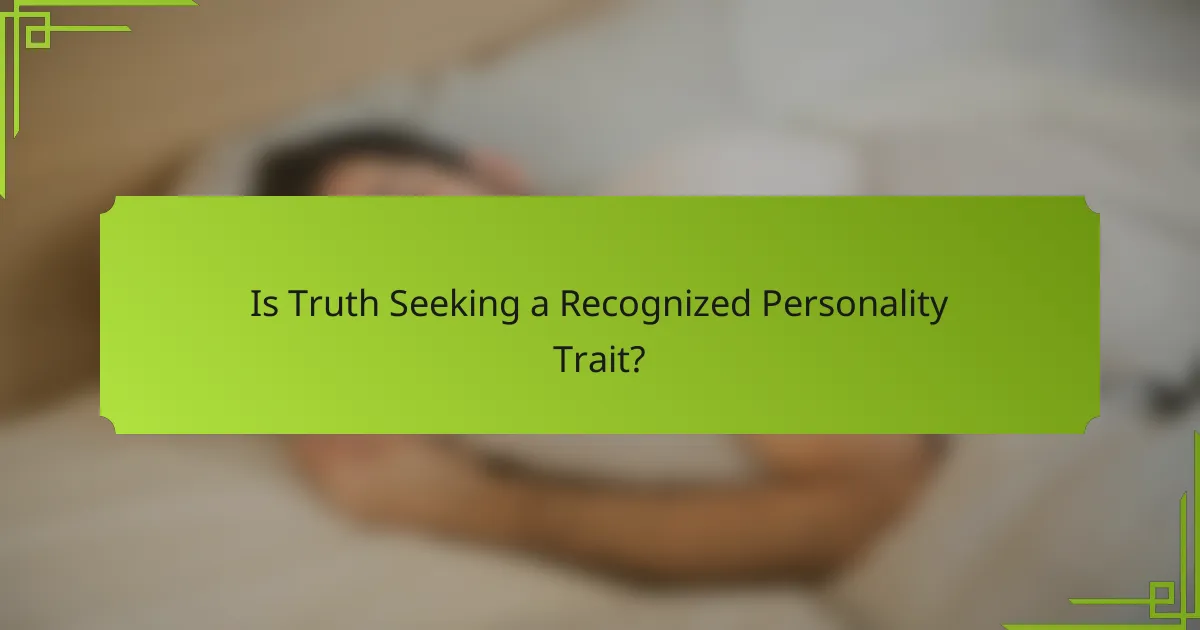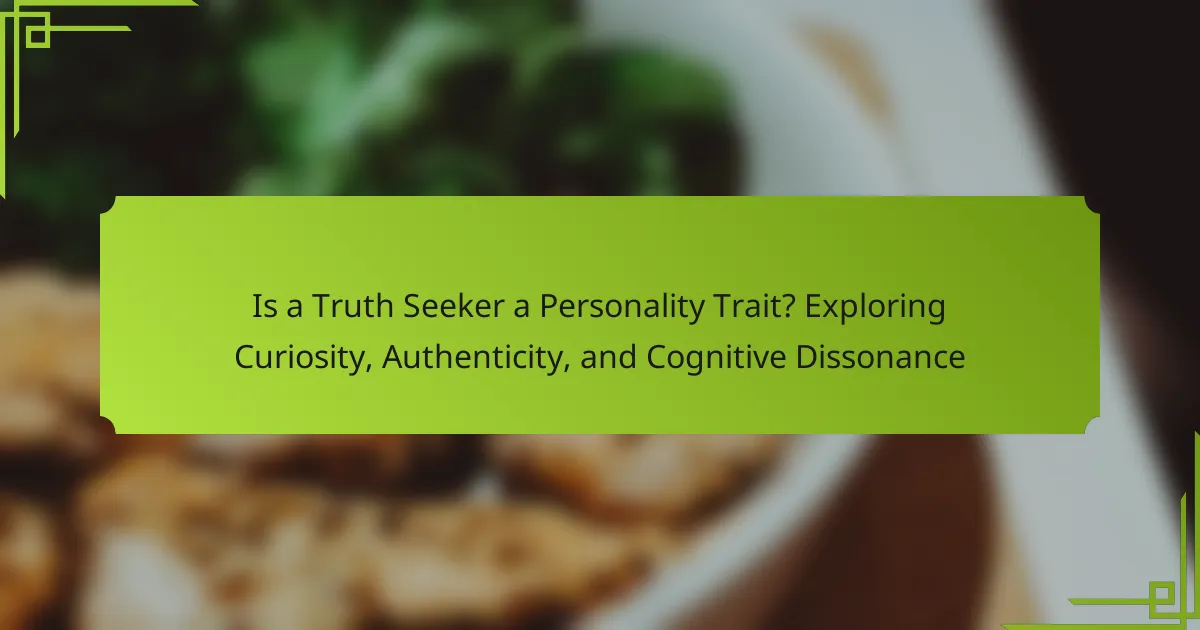Truth seeking is a personality trait characterized by curiosity, authenticity, and cognitive dissonance. This article explores how truth seekers exhibit a strong desire for knowledge, engage in open-minded exploration, and navigate conflicting beliefs. We will examine the universal and unique attributes that define truth seekers, their rare traits, and ways to cultivate this trait for personal growth. Understanding these aspects can enhance interpersonal relationships and foster genuine connections.

Is Truth Seeking a Recognized Personality Trait?
Yes, truth seeking can be recognized as a personality trait. It encompasses curiosity, authenticity, and the ability to navigate cognitive dissonance. Truth seekers often exhibit a strong desire for knowledge and understanding, leading them to question established norms. Research indicates that individuals high in this trait tend to engage in open-minded exploration and critical thinking. This unique attribute fosters personal growth and enhances interpersonal relationships, as truth seekers are more likely to seek genuine connections.
What Psychological Theories Support the Concept of Truth Seeking?
Psychological theories suggest that truth seeking is linked to personality traits like curiosity and cognitive dissonance. Curiosity drives individuals to seek new knowledge, while cognitive dissonance arises when beliefs conflict, prompting a quest for truth. Authenticity is another factor, as truth seekers often prioritize genuine experiences. These traits collectively support the notion that truth seeking is a personality trait influenced by psychological mechanisms.
How Does Curiosity Influence Truth Seeking?
Curiosity significantly influences truth seeking by driving individuals to explore, question, and challenge existing beliefs. This trait fosters authenticity, as truth seekers prioritize genuine understanding over conformity. Cognitive dissonance arises when new information conflicts with established views, prompting further inquiry. Engaging with curiosity enhances critical thinking, leading to deeper insights and more accurate perceptions of reality.
What Types of Curiosity Are Most Relevant?
Curiosity can be categorized into several types that are particularly relevant to truth seekers. These include epistemic curiosity, which drives the desire to acquire knowledge; perceptual curiosity, which is stimulated by novel experiences; and social curiosity, which involves understanding others’ behaviors and motivations. Each type reflects a unique aspect of the truth-seeking personality trait, emphasizing the importance of authenticity and cognitive dissonance in the quest for understanding.
How Does Curiosity Develop Over Time?
Curiosity develops over time through experiences, social interactions, and cognitive growth. It starts in early childhood as innate curiosity and evolves into a more structured approach to seeking knowledge.
As children engage with their environment, they ask questions and explore, laying the groundwork for a truth-seeking personality. This trait is influenced by factors such as parenting styles, education, and peer interactions.
In adolescence, curiosity may be shaped by the desire for authenticity and the management of cognitive dissonance. Individuals begin to question societal norms and seek deeper understanding, reflecting a maturation of their curiosity.
Ultimately, lifelong curiosity is a dynamic trait, influenced by personal experiences and the pursuit of knowledge, leading to an authentic self.
What Role Does Authenticity Play in Truth Seeking?
Authenticity is crucial in truth seeking as it fosters genuine curiosity and openness. A truth seeker, characterized by authenticity, embraces cognitive dissonance, allowing for deeper exploration of conflicting ideas. This authenticity enhances the ability to discern truth from falsehood, promoting a more comprehensive understanding of complex issues. Ultimately, authenticity cultivates an environment conducive to honest inquiry and critical thinking, essential traits for effective truth seeking.
How Can Authenticity Be Measured?
Authenticity can be measured through self-awareness, consistency in actions and beliefs, and the degree of alignment between one’s values and behaviors. These factors indicate a person’s genuine nature and commitment to truth-seeking.
What Are the Psychological Benefits of Authenticity?
Authenticity fosters psychological benefits such as improved self-esteem, reduced anxiety, and enhanced well-being. By embracing authenticity, individuals experience greater life satisfaction and stronger interpersonal relationships. Authenticity encourages self-acceptance, which mitigates cognitive dissonance and promotes mental clarity. Research indicates that authentic individuals are more resilient and adaptable, leading to better coping strategies in challenging situations.
How Does Cognitive Dissonance Affect Truth Seekers?
Cognitive dissonance can challenge truth seekers by creating internal conflict when beliefs clash with new information. This tension often drives them to either adapt their views or seek further evidence to resolve discrepancies. Truth seekers value authenticity and curiosity, making cognitive dissonance a pivotal factor in their pursuit of knowledge. As they encounter conflicting ideas, their response can lead to deeper understanding or reinforce existing biases, shaping their overall worldview.
What Are Common Responses to Cognitive Dissonance?
Common responses to cognitive dissonance include changing beliefs, acquiring new information, or minimizing the importance of the conflict. These responses help individuals restore psychological balance. For example, a truth seeker may embrace curiosity and authenticity, leading to deeper exploration of conflicting ideas. This approach enhances understanding and can reduce dissonance by fostering open-mindedness.
How Can Understanding Cognitive Dissonance Improve Truth Seeking?
Understanding cognitive dissonance enhances truth-seeking by fostering self-reflection and open-mindedness. This psychological concept reveals the discomfort from conflicting beliefs, prompting individuals to reconcile these discrepancies. By acknowledging cognitive dissonance, truth seekers can embrace curiosity, challenge their assumptions, and pursue authenticity. This process deepens their understanding of complex issues, ultimately leading to more informed and honest perspectives.

What Are the Universal Attributes of Truth Seekers?
Truth seekers possess universal attributes such as curiosity, authenticity, and the ability to navigate cognitive dissonance. Curiosity drives their quest for knowledge, pushing them to explore and question. Authenticity reflects their commitment to truth, valuing honesty over conformity. Cognitive dissonance allows them to reconcile conflicting beliefs, fostering deeper understanding. These attributes collectively define the essence of a truth seeker.
How Do Truth Seekers Approach Information Gathering?
Truth seekers approach information gathering with an emphasis on curiosity, authenticity, and critical thinking. They prioritize diverse sources and question established narratives. This method fosters a deeper understanding of complex issues, often leading to cognitive dissonance as they reconcile conflicting information. By actively seeking out different perspectives, truth seekers enhance their knowledge and challenge biases. Their unique attribute lies in their relentless pursuit of accuracy and truth, which drives them to continuously refine their beliefs based on new evidence.
What Emotional Traits Are Common Among Truth Seekers?
Truth seekers commonly exhibit emotional traits such as curiosity, authenticity, and resilience. Curiosity drives their desire for knowledge and understanding, while authenticity fosters genuine connections with others. Resilience helps them navigate cognitive dissonance when confronting conflicting beliefs or information. These traits collectively enhance their pursuit of truth.

What Unique Attributes Distinguish Truth Seekers from Others?
Truth seekers are distinguished by their unique attributes of curiosity, authenticity, and cognitive dissonance. Curiosity drives them to explore diverse perspectives, leading to deeper understanding. Authenticity compels them to pursue truth, valuing honesty over conformity. Cognitive dissonance enables them to confront conflicting beliefs, fostering personal growth. These attributes collectively create a distinct personality trait that sets truth seekers apart from others.
What Motivates Truth Seekers Beyond Curiosity?
Truth seekers are motivated by a desire for authenticity and understanding, transcending mere curiosity. This drive stems from cognitive dissonance, where conflicting beliefs create discomfort, prompting individuals to seek resolution. Authenticity enhances personal identity, making truth-seeking a unique trait that fosters deeper connections and insights. As a result, truth seekers often challenge societal norms, striving for a clearer perception of reality.
How Do Truth Seekers Handle Conflicting Information?
Truth seekers handle conflicting information by approaching it with curiosity and a desire for authenticity. They analyze differing viewpoints, seeking evidence and understanding rather than immediate resolution. This process often leads to cognitive dissonance, where they confront discomfort from conflicting beliefs. As a result, truth seekers may adjust their perspectives or deepen their inquiry to reconcile discrepancies. This adaptive mindset is a unique attribute of truth seekers, allowing them to navigate complexities in information effectively.

What Are the Rare Attributes of Truth Seekers?
Truth seekers exhibit rare attributes such as a relentless pursuit of knowledge, a high tolerance for ambiguity, and an intrinsic motivation to challenge established norms. These traits enable them to embrace uncertainty and seek deeper truths beyond surface-level understanding. Their cognitive dissonance often drives them to reconcile conflicting beliefs, fostering a unique perspective on reality. This combination of curiosity, authenticity, and resilience sets truth seekers apart in their quest for genuine understanding.
How Does a Truth Seeker’s Perspective Impact Their Relationships?
A truth seeker’s perspective can significantly enhance their relationships by fostering open communication and authenticity. This trait encourages individuals to engage deeply, promoting honesty and vulnerability. As a result, relationships often become more meaningful and resilient.
Truth seekers challenge cognitive dissonance, which can lead to constructive conflict resolution. They are less likely to avoid difficult conversations, enabling partners to address underlying issues. This proactive approach cultivates trust and strengthens bonds.
Moreover, the innate curiosity of truth seekers encourages exploration of diverse viewpoints. This openness can lead to richer discussions and a greater understanding of each other’s perspectives. Ultimately, relationships thrive on this foundation of shared values and mutual respect.
What Are the Long-Term Effects of Being a Truth Seeker?
Being a truth seeker can lead to enhanced critical thinking and emotional resilience over time. Long-term effects include increased openness to new experiences, deeper understanding of complex issues, and improved interpersonal relationships. This personality trait fosters authenticity, allowing individuals to align their actions with their values, which can lead to greater life satisfaction. However, it may also result in cognitive dissonance when confronting uncomfortable truths, requiring ongoing self-reflection and adaptation.

How Can One Cultivate Truth Seeking as a Trait?
Cultivating truth seeking as a trait involves embracing curiosity, authenticity, and managing cognitive dissonance. Start by fostering a mindset that values inquiry and open-mindedness. Engage in diverse experiences that challenge your beliefs. Practice self-reflection to align actions with values, enhancing authenticity. Develop resilience to confront cognitive dissonance, allowing for personal growth. Regularly seek feedback to refine your understanding and maintain a commitment to truth.
What Practices Enhance Curiosity and Authenticity?
Practices that enhance curiosity and authenticity include engaging in open-minded discussions, exploring diverse perspectives, and embracing lifelong learning. These actions foster cognitive flexibility and encourage individuals to seek deeper truths. Additionally, self-reflection and mindfulness practices can strengthen authenticity by aligning personal values with actions. Engaging with unfamiliar experiences can also stimulate curiosity, prompting a willingness to question assumptions and explore new ideas.
What Common Mistakes Should Be Avoided in Truth Seeking?
Truth seekers should avoid assumptions, confirmation bias, and emotional reasoning. These mistakes hinder genuine understanding and lead to distorted truths. Acknowledging cognitive dissonance is essential for authentic inquiry. Embrace curiosity and remain open to diverse perspectives to enhance truth-seeking efforts.
What Expert Insights Can Guide Aspiring Truth Seekers?
A truth seeker embodies a personality trait characterized by curiosity, authenticity, and a willingness to confront cognitive dissonance. These qualities drive individuals to pursue knowledge and understanding relentlessly.
Curiosity fuels the desire to explore beyond surface-level information, prompting deeper inquiries. Authenticity ensures that truth seekers remain true to their values and beliefs, even when faced with uncomfortable truths. Cognitive dissonance challenges individuals to reconcile conflicting information, fostering personal growth and a more nuanced perspective.
Research indicates that truth seekers often exhibit higher levels of critical thinking skills. This trait enables them to analyze information critically and differentiate between fact and opinion. The interplay of these attributes creates a unique profile, distinguishing truth seekers from those who may accept information at face value.
In summary, aspiring truth seekers can benefit from embracing curiosity, authenticity, and cognitive dissonance as guiding principles in their quest for deeper understanding.
